By Matt Applegate · Tuesday, May 6, 2014 As an occasional feature on TELOSscope, we highlight a past Telos article whose critical insights continue to illuminate our thinking and challenge our assumptions. Today, Matt Applegate looks at Arshi Pipa’s “Gramsci as a (Non) Literary Critic” from Telos 57 (Fall 1983).
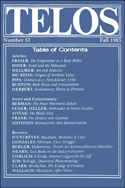 Arshi Pipa’s “Gramsci as a (Non) Literary Critic” is more than a short biography and description of Antonio Gramsci’s inquiries into literary criticism. It also provokes the reader to meditate on the political conditions of literary criticism as an intellectual practice. Gramsci is a controversial figure in the history of literary criticism for at least two reasons, according to Pipa. First, his political work remains more prominent than his literary criticism. When one thinks of Gramsci as a writer and historical figure, his literary criticism might not even register, given his political writing and influence. Second, Gramsci’s politics serve as the impetus for his intellectual projects, thus also providing potential grounds to dismiss or ignore his aesthetic analyses. To be sure, Gramsci is a controversial political figure. In 1921 Gramsci co-founded and led the Communist Party of Italy in opposition to fascism, and was later arrested by fascist police under Mussolini, ultimately dying in prison in 1937. Perhaps his most famous collection of writings, Prison Notebooks, was completed while he was incarcerated between 1926 and 1937. Yet, it is precisely Gramsci’s controversial style and political will that draw Pipa to his work and allow him to question literary criticism as an enduring intellectual practice. Arshi Pipa’s “Gramsci as a (Non) Literary Critic” is more than a short biography and description of Antonio Gramsci’s inquiries into literary criticism. It also provokes the reader to meditate on the political conditions of literary criticism as an intellectual practice. Gramsci is a controversial figure in the history of literary criticism for at least two reasons, according to Pipa. First, his political work remains more prominent than his literary criticism. When one thinks of Gramsci as a writer and historical figure, his literary criticism might not even register, given his political writing and influence. Second, Gramsci’s politics serve as the impetus for his intellectual projects, thus also providing potential grounds to dismiss or ignore his aesthetic analyses. To be sure, Gramsci is a controversial political figure. In 1921 Gramsci co-founded and led the Communist Party of Italy in opposition to fascism, and was later arrested by fascist police under Mussolini, ultimately dying in prison in 1937. Perhaps his most famous collection of writings, Prison Notebooks, was completed while he was incarcerated between 1926 and 1937. Yet, it is precisely Gramsci’s controversial style and political will that draw Pipa to his work and allow him to question literary criticism as an enduring intellectual practice.
Continue reading →
By Matt Applegate · Thursday, March 13, 2014 As an occasional feature on TELOSscope, we highlight a past Telos article whose critical insights continue to illuminate our thinking and challenge our assumptions. Today, Matt Applegate looks at Paul Piccone’s “Students’ Protest, Class-Structure, and Ideology” from Telos 3 (Spring 1969).
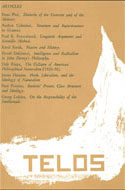 Paul Piccone’s 1969 essay “Students’ Protest, Class-Structure, and Ideology” captures the revolutionary ethos of that time in the United States. Hippies, student politics, Black Power, as well as the work of such figures as Régis Debray and Herbert Marcuse all come under Piccone’s earnest critical consideration. His primary concern, however, is the link between these student revolts and the state of education in the United States. On the one hand, Piccone is intent on charting the means by which hyper-industrialization and the technologization of work lead to open student rebellion. On the other, he is interested in understanding why student rebellion is effective in relation to other forms of revolutionary organization that appear alongside it. Paul Piccone’s 1969 essay “Students’ Protest, Class-Structure, and Ideology” captures the revolutionary ethos of that time in the United States. Hippies, student politics, Black Power, as well as the work of such figures as Régis Debray and Herbert Marcuse all come under Piccone’s earnest critical consideration. His primary concern, however, is the link between these student revolts and the state of education in the United States. On the one hand, Piccone is intent on charting the means by which hyper-industrialization and the technologization of work lead to open student rebellion. On the other, he is interested in understanding why student rebellion is effective in relation to other forms of revolutionary organization that appear alongside it.
Continue reading →
By Matt Applegate · Tuesday, February 11, 2014 As an occasional feature on TELOSscope, we highlight a past Telos article whose critical insights continue to illuminate our thinking and challenge our assumptions. Today, Matt Applegate looks at André Gorz’s “The Tyranny of the Factory: Today and Tomorrow” from Telos 16 (Summer 1973).
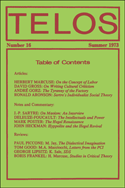 “There is a link between the crisis of School (school instruction) and the crisis of tyranny in the factory,” André Gorz proclaims in his 1973 article “The Tyranny of the Factory: Today and Tomorrow” (64). An Austrian-born social theorist, Gorz is known primarily for his interventions in political ecology and social analysis of capitalism. His focus on capital and education is not unrelated here, however. Substantively more than an abstract analysis of working conditions in the contemporary factory or a sweeping statement concerning the state of education in France, Gorz links the culture of factory labor to the imperatives of discipline and command in educational settings. The underlying claim here is that the logic of capitalism and the raison d’être of state-run education have become synonymous, resulting in both an auto-social response to capital’s hegemony in all forms of life and the elimination of pedagogical forms that inspire critical thought and practice. With this claim, at least three points of focus must be highlighted. “There is a link between the crisis of School (school instruction) and the crisis of tyranny in the factory,” André Gorz proclaims in his 1973 article “The Tyranny of the Factory: Today and Tomorrow” (64). An Austrian-born social theorist, Gorz is known primarily for his interventions in political ecology and social analysis of capitalism. His focus on capital and education is not unrelated here, however. Substantively more than an abstract analysis of working conditions in the contemporary factory or a sweeping statement concerning the state of education in France, Gorz links the culture of factory labor to the imperatives of discipline and command in educational settings. The underlying claim here is that the logic of capitalism and the raison d’être of state-run education have become synonymous, resulting in both an auto-social response to capital’s hegemony in all forms of life and the elimination of pedagogical forms that inspire critical thought and practice. With this claim, at least three points of focus must be highlighted.
Continue reading →
By Matt Applegate · Tuesday, December 17, 2013 As an occasional feature on TELOSscope, we highlight a past Telos article whose critical insights continue to illuminate our thinking and challenge our assumptions. Today, Matt Applegate looks at Yvette Biro’s “The Intellectual Film: Eisenstein’s Plan to Film Marx’s Capital“ from Telos 39 (Spring 1979).
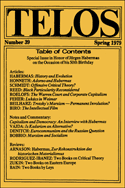 It is difficult to think of what cinema is in the present, and indeed, what cinema might be in the future, outside of large studio systems, box office opening numbers, and global profit intake. Even so-called “independent” films often circulate in a virtual minor league of the Hollywood studio system, vying for wide release. To be sure, cinema’s thorough commodification both limits its potential for aesthetic experimentation and makes it easier to equate it with other forms of media. When cinema becomes secondary to the metrics of profit, its distinct aesthetic qualities are subordinate to its function as a product comprised of moving images and sound. Moreover, as film moves away from celluloid and toward digital formats, one is compelled to ask what makes cinema distinct as visual technology is homogenized. This is not to say that cinematic experience and practice are bankrupt aesthetic qualities or that film is doomed to devolve into an indistinct mesh of CGI and user-generated websites like YouTube and Vine. Rather, as Yvette Biro suggests in her “The Intellectual Film: Eisenstein’s Plan to Film Marx’s Capital,” the horizon of cinematic thought and practice is perhaps best imagined by examining the relation between ideology and cinematic aesthetics. It is difficult to think of what cinema is in the present, and indeed, what cinema might be in the future, outside of large studio systems, box office opening numbers, and global profit intake. Even so-called “independent” films often circulate in a virtual minor league of the Hollywood studio system, vying for wide release. To be sure, cinema’s thorough commodification both limits its potential for aesthetic experimentation and makes it easier to equate it with other forms of media. When cinema becomes secondary to the metrics of profit, its distinct aesthetic qualities are subordinate to its function as a product comprised of moving images and sound. Moreover, as film moves away from celluloid and toward digital formats, one is compelled to ask what makes cinema distinct as visual technology is homogenized. This is not to say that cinematic experience and practice are bankrupt aesthetic qualities or that film is doomed to devolve into an indistinct mesh of CGI and user-generated websites like YouTube and Vine. Rather, as Yvette Biro suggests in her “The Intellectual Film: Eisenstein’s Plan to Film Marx’s Capital,” the horizon of cinematic thought and practice is perhaps best imagined by examining the relation between ideology and cinematic aesthetics.
Continue reading →
By Matt Applegate · Tuesday, August 7, 2012 A new manifesto for the radical Left is vital, and it is to emerge from whispers, riddles, and aphorisms without lapsing into dogma, pure utopia, or party politics. Its focus will be on practice and action, but it will refuse to take command of the future. A new manifesto is, if it is to be all of these things at once, improvisation. These are a few of the basic features and premises of Adorno and Horkheimer’s 1956 dialogue, posthumously titled Towards a New Manifesto. Writing and dialoging in the wake and in the midst of fascist reign in Western Europe and Imperial Japan, Adorno and Horkheimer attempt to revision a primary genre of resistance by critically assessing what gains and what limitations philosophy presents for the Twentieth century. Indeed, at the time of their dialogue, political forms and power constellations are at a crossroads. Democracy has emerged as the dominant political form in the free world, and the stage is set for the global emergence of free market capitalism. At the same time, Adorno and Horkheimer are skeptical of their current political situation in the West and claim that “it is not just worse” than prior moments in history, it lacks direction in the face of horrific human rights violations and a shifting political landscape.
Continue reading →
By Matt Applegate · Thursday, February 23, 2012 This paper was presented at the 2012 Telos Conference, “Space: Virtuality, Territoriality, Relationality,” held on January 14–15, in New York City.
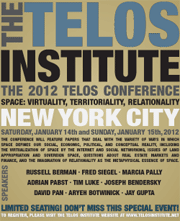 The following is an exploration of the relationship shared between space, relationality, and virtuality as it comes to bear on a particular genre of revolutionary expression: the manifesto. My argument here is in opposition to thinkers like Naomi Klein who have asserted the virtual power of the internet and social media to be the end of the manifesto genre; something like, we have twitter, we have Facebook, therefore manifestos are obsolete.[1] Rather, my argument is in favor of a metamorphosis where the genre is concerned and where revolutionary expression is evolving. To put it another way, I am interested in thinking a politics of the manifesto genre that exceeds its own instrumentality. So the manifesto is being treated here as a provocation toward thinking the shape and character of a radical politics. By way of a brief and somewhat simplified characterization of the genre, I want to think in opposition to, or beyond, two primary problems where the genre is concerned. First, I want to think the function of the manifesto against an ought or revolutionary telos that would name its future and provide the political program to manifest it. Second, I want to problematize the Schmittian character of the genre, the bi-partisan, “friend” vs. “enemy” relation that is so often asserted where the manifesto names a revolutionary telos. The following is an exploration of the relationship shared between space, relationality, and virtuality as it comes to bear on a particular genre of revolutionary expression: the manifesto. My argument here is in opposition to thinkers like Naomi Klein who have asserted the virtual power of the internet and social media to be the end of the manifesto genre; something like, we have twitter, we have Facebook, therefore manifestos are obsolete.[1] Rather, my argument is in favor of a metamorphosis where the genre is concerned and where revolutionary expression is evolving. To put it another way, I am interested in thinking a politics of the manifesto genre that exceeds its own instrumentality. So the manifesto is being treated here as a provocation toward thinking the shape and character of a radical politics. By way of a brief and somewhat simplified characterization of the genre, I want to think in opposition to, or beyond, two primary problems where the genre is concerned. First, I want to think the function of the manifesto against an ought or revolutionary telos that would name its future and provide the political program to manifest it. Second, I want to problematize the Schmittian character of the genre, the bi-partisan, “friend” vs. “enemy” relation that is so often asserted where the manifesto names a revolutionary telos.
Continue reading →
|
|
 Arshi Pipa’s “Gramsci as a (Non) Literary Critic” is more than a short biography and description of Antonio Gramsci’s inquiries into literary criticism. It also provokes the reader to meditate on the political conditions of literary criticism as an intellectual practice. Gramsci is a controversial figure in the history of literary criticism for at least two reasons, according to Pipa. First, his political work remains more prominent than his literary criticism. When one thinks of Gramsci as a writer and historical figure, his literary criticism might not even register, given his political writing and influence. Second, Gramsci’s politics serve as the impetus for his intellectual projects, thus also providing potential grounds to dismiss or ignore his aesthetic analyses. To be sure, Gramsci is a controversial political figure. In 1921 Gramsci co-founded and led the Communist Party of Italy in opposition to fascism, and was later arrested by fascist police under Mussolini, ultimately dying in prison in 1937. Perhaps his most famous collection of writings, Prison Notebooks, was completed while he was incarcerated between 1926 and 1937. Yet, it is precisely Gramsci’s controversial style and political will that draw Pipa to his work and allow him to question literary criticism as an enduring intellectual practice.
Arshi Pipa’s “Gramsci as a (Non) Literary Critic” is more than a short biography and description of Antonio Gramsci’s inquiries into literary criticism. It also provokes the reader to meditate on the political conditions of literary criticism as an intellectual practice. Gramsci is a controversial figure in the history of literary criticism for at least two reasons, according to Pipa. First, his political work remains more prominent than his literary criticism. When one thinks of Gramsci as a writer and historical figure, his literary criticism might not even register, given his political writing and influence. Second, Gramsci’s politics serve as the impetus for his intellectual projects, thus also providing potential grounds to dismiss or ignore his aesthetic analyses. To be sure, Gramsci is a controversial political figure. In 1921 Gramsci co-founded and led the Communist Party of Italy in opposition to fascism, and was later arrested by fascist police under Mussolini, ultimately dying in prison in 1937. Perhaps his most famous collection of writings, Prison Notebooks, was completed while he was incarcerated between 1926 and 1937. Yet, it is precisely Gramsci’s controversial style and political will that draw Pipa to his work and allow him to question literary criticism as an enduring intellectual practice.  Paul Piccone’s 1969 essay
Paul Piccone’s 1969 essay  “There is a link between the crisis of School (school instruction) and the crisis of tyranny in the factory,” André Gorz proclaims in his 1973 article “The Tyranny of the Factory: Today and Tomorrow” (64). An Austrian-born social theorist, Gorz is known primarily for his interventions in political ecology and social analysis of capitalism. His focus on capital and education is not unrelated here, however. Substantively more than an abstract analysis of working conditions in the contemporary factory or a sweeping statement concerning the state of education in France, Gorz links the culture of factory labor to the imperatives of discipline and command in educational settings. The underlying claim here is that the logic of capitalism and the raison d’être of state-run education have become synonymous, resulting in both an auto-social response to capital’s hegemony in all forms of life and the elimination of pedagogical forms that inspire critical thought and practice. With this claim, at least three points of focus must be highlighted.
“There is a link between the crisis of School (school instruction) and the crisis of tyranny in the factory,” André Gorz proclaims in his 1973 article “The Tyranny of the Factory: Today and Tomorrow” (64). An Austrian-born social theorist, Gorz is known primarily for his interventions in political ecology and social analysis of capitalism. His focus on capital and education is not unrelated here, however. Substantively more than an abstract analysis of working conditions in the contemporary factory or a sweeping statement concerning the state of education in France, Gorz links the culture of factory labor to the imperatives of discipline and command in educational settings. The underlying claim here is that the logic of capitalism and the raison d’être of state-run education have become synonymous, resulting in both an auto-social response to capital’s hegemony in all forms of life and the elimination of pedagogical forms that inspire critical thought and practice. With this claim, at least three points of focus must be highlighted.  It is difficult to think of what cinema is in the present, and indeed, what cinema might be in the future, outside of large studio systems, box office opening numbers, and global profit intake. Even so-called “independent” films often circulate in a virtual minor league of the Hollywood studio system, vying for wide release. To be sure, cinema’s thorough commodification both limits its potential for aesthetic experimentation and makes it easier to equate it with other forms of media. When cinema becomes secondary to the metrics of profit, its distinct aesthetic qualities are subordinate to its function as a product comprised of moving images and sound. Moreover, as film moves away from celluloid and toward digital formats, one is compelled to ask what makes cinema distinct as visual technology is homogenized. This is not to say that cinematic experience and practice are bankrupt aesthetic qualities or that film is doomed to devolve into an indistinct mesh of CGI and user-generated websites like YouTube and Vine. Rather, as Yvette Biro suggests in her “The Intellectual Film: Eisenstein’s Plan to Film Marx’s Capital,” the horizon of cinematic thought and practice is perhaps best imagined by examining the relation between ideology and cinematic aesthetics.
It is difficult to think of what cinema is in the present, and indeed, what cinema might be in the future, outside of large studio systems, box office opening numbers, and global profit intake. Even so-called “independent” films often circulate in a virtual minor league of the Hollywood studio system, vying for wide release. To be sure, cinema’s thorough commodification both limits its potential for aesthetic experimentation and makes it easier to equate it with other forms of media. When cinema becomes secondary to the metrics of profit, its distinct aesthetic qualities are subordinate to its function as a product comprised of moving images and sound. Moreover, as film moves away from celluloid and toward digital formats, one is compelled to ask what makes cinema distinct as visual technology is homogenized. This is not to say that cinematic experience and practice are bankrupt aesthetic qualities or that film is doomed to devolve into an indistinct mesh of CGI and user-generated websites like YouTube and Vine. Rather, as Yvette Biro suggests in her “The Intellectual Film: Eisenstein’s Plan to Film Marx’s Capital,” the horizon of cinematic thought and practice is perhaps best imagined by examining the relation between ideology and cinematic aesthetics.  The following is an exploration of the relationship shared between space, relationality, and virtuality as it comes to bear on a particular genre of revolutionary expression: the manifesto. My argument here is in opposition to thinkers like Naomi Klein who have asserted the virtual power of the internet and social media to be the end of the manifesto genre; something like, we have twitter, we have Facebook, therefore manifestos are obsolete.[1] Rather, my argument is in favor of a metamorphosis where the genre is concerned and where revolutionary expression is evolving. To put it another way, I am interested in thinking a politics of the manifesto genre that exceeds its own instrumentality. So the manifesto is being treated here as a provocation toward thinking the shape and character of a radical politics. By way of a brief and somewhat simplified characterization of the genre, I want to think in opposition to, or beyond, two primary problems where the genre is concerned. First, I want to think the function of the manifesto against an ought or revolutionary telos that would name its future and provide the political program to manifest it. Second, I want to problematize the Schmittian character of the genre, the bi-partisan, “friend” vs. “enemy” relation that is so often asserted where the manifesto names a revolutionary telos.
The following is an exploration of the relationship shared between space, relationality, and virtuality as it comes to bear on a particular genre of revolutionary expression: the manifesto. My argument here is in opposition to thinkers like Naomi Klein who have asserted the virtual power of the internet and social media to be the end of the manifesto genre; something like, we have twitter, we have Facebook, therefore manifestos are obsolete.[1] Rather, my argument is in favor of a metamorphosis where the genre is concerned and where revolutionary expression is evolving. To put it another way, I am interested in thinking a politics of the manifesto genre that exceeds its own instrumentality. So the manifesto is being treated here as a provocation toward thinking the shape and character of a radical politics. By way of a brief and somewhat simplified characterization of the genre, I want to think in opposition to, or beyond, two primary problems where the genre is concerned. First, I want to think the function of the manifesto against an ought or revolutionary telos that would name its future and provide the political program to manifest it. Second, I want to problematize the Schmittian character of the genre, the bi-partisan, “friend” vs. “enemy” relation that is so often asserted where the manifesto names a revolutionary telos. 

